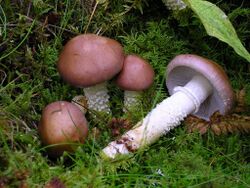Biology:Stropharia hornemannii
From HandWiki
Short description: Species of fungus
| Stropharia hornemannii | |
|---|---|

| |
| Scientific classification | |
| Domain: | Eukaryota |
| Kingdom: | Fungi |
| Division: | Basidiomycota |
| Class: | Agaricomycetes |
| Order: | Agaricales |
| Family: | Strophariaceae |
| Genus: | Stropharia |
| Species: | S. hornemannii
|
| Binomial name | |
| Stropharia hornemannii (Fr.) S.Lundell & Nannf. (1934)
| |
| Synonyms[1] | |
| |
Stropharia hornemannii, commonly known as the luxuriant ringstalk,[2] or lacerated stropharia,[3] is a species of agaric fungus in the family Strophariaceae. It is found in Europe and North America, where it grows as a saprophyte on rotting conifer wood. The specific epithet hornemannii honors Danish botanist Jens Wilken Hornemann, who made the first scientifically documented collections of the species.[4] It is inedible and may be poisonous.[5]
It is similar to Stropharia ambigua.[6]
References
| Stropharia hornemannii | |
|---|---|
| Mycological characteristics | |
| gills on hymenium | |
| cap is convex | |
| hymenium is adnate or seceding | |
| stipe has a ring | |
| spore print is purple-brown to purple-black | |
| ecology is saprotrophic | |
| edibility: inedible or poisonous | |
- ↑ "GSD Species Synonymy: Stropharia hornemannii (Fr.) S. Lundell & Nannf.". Species Fungorum. CAB International. http://www.speciesfungorum.org/GSD/GSDspecies.asp?RecordID=114458.
- ↑ McKnight KH. (1998). A Field Guide to Mushrooms: North America. Houghton Mifflin Harcourt. p. 208. ISBN 978-0-395-91090-0. https://books.google.com/books?id=kSdA3V7Z9WcC&pg=PA208-IA64.
- ↑ Bessette A. (1997). Mushrooms of Northeastern North America. Syracuse, New York: Syracuse University Press. p. 250. ISBN 978-0-8156-0388-7. https://books.google.com/books?id=T2uU12XcRD4C&pg=PA250.
- ↑ Smith AH, Weber NS. (1980). The Mushroom Hunter's Field Guide. University of Michigan Press. p. 226. ISBN 0-472-85610-3. https://books.google.com/books?id=TYI4f6fqrfkC&pg=PA226.
- ↑ Phillips, Roger (2010). Mushrooms and Other Fungi of North America. Buffalo, NY: Firefly Books. p. 228. ISBN 978-1-55407-651-2.
- ↑ Trudell, Steve; Ammirati, Joe (2009). Mushrooms of the Pacific Northwest. Timber Press Field Guides. Portland, OR: Timber Press. pp. 211. ISBN 978-0-88192-935-5. https://books.google.com/books?id=WevHvt6Tr8kC.
Wikidata ☰ Q334957 entry
 |

